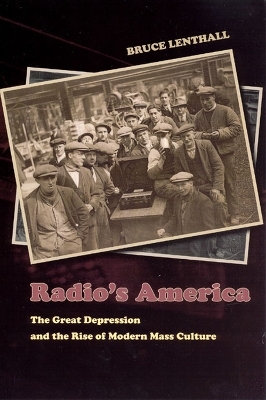
Radio's America
The Great Depression and the Rise of Modern Mass Culture
Seiten
2007
University of Chicago Press (Verlag)
978-0-226-47192-1 (ISBN)
University of Chicago Press (Verlag)
978-0-226-47192-1 (ISBN)
Documents the impact radio had on the lives of Depression-era Americans and charts the formative years of our modern mass culture. Offering insight into radio's use as a persuasive tool, this work explores how ordinary Americans made radio a part of their lives. It also reveals how the connections between power and mass media began.
Orson Welles' greatest breakthrough into the popular consciousness occurred in 1938, three years before Citizen Kane, when his "War of the Worlds" radio broadcast succeeded so spectacularly that terrified listeners believed they were hearing a genuine report of an alien invasion - a landmark in the history of radio's powerful relationship with its audience. In "Radio's America", Bruce Lenthall documents the enormous impact radio had on the lives of Depression-era Americans and charts the formative years of our modern mass culture. Many Americans became alienated from their government and economy in the twentieth century, and Lenthall explains that radio's appeal came from its ability to personalize an increasingly impersonal public arena. His depictions of such figures as proto-Fascist Charles Coughlin and medical quack John Brinkley offer penetrating insight into radio's use as a persuasive tool, and Lenthall's book is unique in its exploration of how ordinary Americans made radio a part of their lives. Television inherited radio's cultural role, and as the voting tallies for "American Idol" attest, broadcasting continues to occupy a powerfully intimate place in American life.
"Radio's America" reveals how the connections between power and mass media began.
Orson Welles' greatest breakthrough into the popular consciousness occurred in 1938, three years before Citizen Kane, when his "War of the Worlds" radio broadcast succeeded so spectacularly that terrified listeners believed they were hearing a genuine report of an alien invasion - a landmark in the history of radio's powerful relationship with its audience. In "Radio's America", Bruce Lenthall documents the enormous impact radio had on the lives of Depression-era Americans and charts the formative years of our modern mass culture. Many Americans became alienated from their government and economy in the twentieth century, and Lenthall explains that radio's appeal came from its ability to personalize an increasingly impersonal public arena. His depictions of such figures as proto-Fascist Charles Coughlin and medical quack John Brinkley offer penetrating insight into radio's use as a persuasive tool, and Lenthall's book is unique in its exploration of how ordinary Americans made radio a part of their lives. Television inherited radio's cultural role, and as the voting tallies for "American Idol" attest, broadcasting continues to occupy a powerfully intimate place in American life.
"Radio's America" reveals how the connections between power and mass media began.
Bruce Lenthall is director of the Center for Teaching and Learning and adjunct assistant professor of history at the University of Pennsylvania.
| Erscheint lt. Verlag | 10.7.2007 |
|---|---|
| Sprache | englisch |
| Maße | 17 x 23 mm |
| Gewicht | 397 g |
| Themenwelt | Geschichte ► Teilgebiete der Geschichte ► Kulturgeschichte |
| Sozialwissenschaften ► Kommunikation / Medien ► Medienwissenschaft | |
| ISBN-10 | 0-226-47192-6 / 0226471926 |
| ISBN-13 | 978-0-226-47192-1 / 9780226471921 |
| Zustand | Neuware |
| Haben Sie eine Frage zum Produkt? |
Mehr entdecken
aus dem Bereich
aus dem Bereich
der stille Abschied vom bäuerlichen Leben in Deutschland
Buch | Hardcover (2023)
C.H.Beck (Verlag)
CHF 32,15
vom Mittelalter bis zur Gegenwart
Buch | Softcover (2024)
C.H.Beck (Verlag)
CHF 16,80


